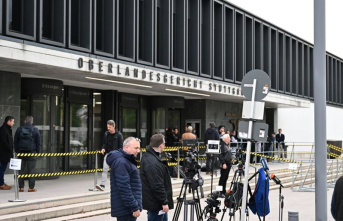Before the education summit in Berlin, politicians from the FDP and the Greens pushed for more cooperation between the various levels in the education sector. Federal Education Minister Bettina Stark-Watzinger (FDP) called for fundamental reforms. She told the "Bild am Sonntag": "The German education system is in a deep crisis that affects us all." The federal, state and local governments should all pull together in education. The federal government cannot always continue to give money. "We finally have to tackle the structural problems. That will only work with a new form and culture of cooperation with everyone involved. We have to set up an education team instead of pointing the finger at others."
Representatives from politics, science and civil society will meet in Berlin on Tuesday for the education summit, which Stark-Watzinger will also attend. The traffic light had agreed on such a meeting in its coalition agreement. Improvements in the education system are often made more difficult because of the division of responsibilities between the federal, state and local governments. After the meeting, a new working group with representatives from all sides and additional experts will develop proposals for better cooperation.
Education experts from the Greens also called for better cooperation between the various levels and actors in education policy. "The education summit must set an exclamation mark and make it clear that only more successful cooperation for better education with equal opportunities will ensure Germany's future viability," said Kai Gehring, the chairman of the Bundestag's education committee, the German press agency. The meeting must be the starting signal for a new culture of cooperation between federal, state and local governments with educational research and civil society.
Warning against devaluation of Abitur grades
He referred to burning problems such as the shortage of teachers, learning deficits and deterioration in student performance as well as a high school dropout rate against the background of the worsening shortage of skilled workers. All levels and actors are called upon to ensure more equal opportunities, greater permeability, quality and performance as well as opportunities for advancement "so that we don't slide into a deep educational crisis".
The head of the ifo Center for Educational Economics, Ludger Wößmann, warned that the Abitur grades would be devalued as a result of the corona pandemic. "We urgently need to go back to the previous grading and the previous entitlement to performance, otherwise the important signal effect of the Abitur grades will be lost," he told the "Bild am Sonntag".
The educational policy spokeswoman for the FDP in the Bundestag, Ria Schröder, criticized the different requirements in the federal states: "Germany affords 16 different school systems, curricula and examination regulations. There can be no uniform Abitur," Schröder told the newspaper. "We need more quality through comparability in education."











